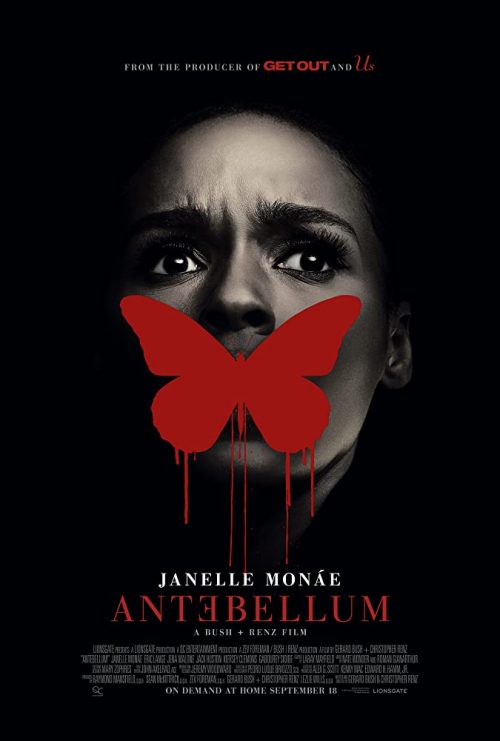The provocative and timely thriller/pseudo horror film Antebellum arrives at a particularly divisive time in American history that, perhaps mirrors the period it depicts so splendidly onscreen. As the country struggles to finds its moral way amidst a tide of social change that seems to be pushing the ideals of the Constitution aside for those of individuals, this film serves as a reminder of exactly what this country is capable of when it lives up to its potential and what it can be if it fails to do so as well.

Set in a pseudo-what if the South had won the Civil War American horrorscape, the film follows author Veronica Henley (Janelle Monáe) as she becomes trapped in an alternate reality that may just be too much for her to survive. This is achieved most effectively by thrusting the viewer into the horrors of slavery for the first third of the film before suggesting that the story is anything more than an accounting of the atrocities of slavery.
While it is easy to compare Antebellum to films like Get Out (2017) and Us (2019), given their proximity and shared producer, that does a disservice to this film. Those earlier films were far more entrenched in the horror genre and were subsequently able to deliver social commentary without being called over-the-top or predictable. However, when you have a story about the horrors of slavery and the essential treatise is that that practice is a bad thing, there is no tangible way to make that a ground-breaking concept. It is an abomination of the so-called principles of the American Dream and there no way to sugar coat it. The horror in Antebellum is brought to life by the participants in the deception that fully embrace and enact the ideals and the Southern way of life it depicts.

Janelle Monáe in “Antebellum.”
What Antebellum does do extremely well is deliver a parable along the lines of some of the best episodes of The Twilight Zone that is designed to force an audience question its own beliefs and attitudes towards everyone depicted onscreen as well as the practices enacted. Essentially, this is a film that questions exactly what side of history you may choose to be on, which is an especially poignant exploration given the political and social climate within the United States today.
The writing/directing partnership of Gerard Bush and Christopher Renz, known previously for extensive work in political shorts and videos, make their feature debut here. While it would be easy to dismiss their work here as formulaic or derivative, it is nothing of the sort. There is an honesty and a distinct mastery of the art of storytelling that is at play here that could easily have been loss had the filmmakers not treated the subject with such care and devotion to the message they are intending to impart.
There is a point near the middle of Antebellum there is a scene where Henley’s daughter asks her how someone could be racist and the mother replies: “Sometimes, what looks like anger, is really just fear.” The girl takes that in and nods. Apparently, the children are still intent on showing us how to be our best selves, even today.

| Producer: | Gerard Bush, Zev Foreman, Raymond Mansfield, Sean McKittrick, Christopher Renz, Lezlie Wills |
| Release Date: | September 18, 2020 (Opens on PVOD) |
| Running Time: | 105 minutes |
| Starring: | Janelle Monáe, Eric Lange, Jena Malone, Jack Huston, Kiersey Clemons, Gabourey Sidibe, Marque Richardson, Robert Aramayo, Lily Cowles, Tongayi Chirisa |
| User Rating: | |
| Writer: | Gerard Bush, Christopher Renz |
| MPAA Rating: | R (for disturbing violent content, language, and sexual references) |
| Director: | Gerard Bush, Christoper Renz |
| Distributor: | Lionsgate |
| External Info: | Official Site |
